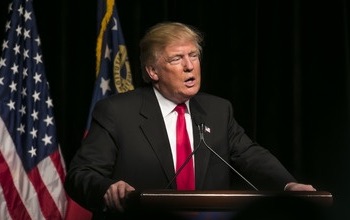 President-Elect Donald Trump has announced that he will withdraw the United States from the Trans-Pacific Partnership (TPP) agreement on his first day in office. So ends more than five years of often heated negotiations led by President Barack Obama’s administration as part of an overall strategy to strengthen the US position in the Pacific Rim region.
President-Elect Donald Trump has announced that he will withdraw the United States from the Trans-Pacific Partnership (TPP) agreement on his first day in office. So ends more than five years of often heated negotiations led by President Barack Obama’s administration as part of an overall strategy to strengthen the US position in the Pacific Rim region.
As in any international trade agreement, intellectual property rights (IPR) were a central theme in the TPP. After all, IPRs are granted and enforced at the national level. International trade in knowledge products can only be promoted if there is IPR coordination across the countries entering into the agreement.
IPR issues were negotiated passionately during the drafting of the agreement and were the subject of some of the loudest opposition to the TPP. Although the TPP agreement itself is under the gun, the IPR issues raised and contested will continue to play a prominent role in the bilateral or multilateral trade agreements that will be negotiated in its place.
First of all, the 5Ws of the TPP
Who: 12 Pacific Rim countries (in alphabetical order): Australia, Brunei, Canada, Chile, Japan, Malaysia, Mexico, New Zealand, Peru, Singapore, USA, Vietnam. Note the conspicuous absence of China.
What: A mega-regional trade agreement that removes or reduces tariff barriers and harmonizes key commercial practices in order to promote a free yet safe flow of goods among the member countries.
When and Where: After five years of highly secretive negotiations, the TPP was finalized in Atlanta, Georgia on October 5, 2015 and signed on February 4, 2016 in Auckland, New Zealand – subject to ratification by the signatory countries within 24 months.
Why: According to the Office of the United States Trade Representative (USTR), the TPP is meant to “promote economic growth; support the creation and retention of jobs; enhance innovation, productivity and competitiveness; raise living standards; reduce poverty in our countries; and promote transparency, good governance, and enhanced labor and environmental protections.”
The TPP IP innovations
In general, the IPR-related TPP clauses are based on existing international IPR standards such as TRIPS (WTO agreement on Trade-Related Aspects of Intellectual Property Rights), WIPO and PCT. However, the US negotiators in particular were seeking to significantly strengthen and broaden the protection for patents, trademarks, copyrights and trade secrets – including rights on digital media and pharmaceutical products. While not all of the US provisions were accepted, former World Bank Director of Economic Policy and Debt Carlos Braga provides an excellent summary of the noteworthy measures that did make it into the agreement:
- Extended trademark terms of protection
- A minimum copyright term of protection of at least 70 years (TRIPS’ minimum standard is 50 years)
- Stronger copyright enforcement, including the possibility of criminal prosecution and the requirement that TPP countries be signatories of WIPO Internet treaties
- Requirement to put in place enforceable legal means for the protection of trade secrets
- Protection of test data submitted for marketing approvals (at least 10 years for agricultural chemicals and 5 to 8 years for pharmaceuticals)
- Explicit protections for new pharmaceutical products that are or contain a biologic (the TPP is the first trade agreement to do this)
The test data exclusivity debate
As noted above, TPP granted 5 to 8 years of test data protection for pharmaceutical products. This clause was one of the most hotly contested issues during the TPP negotiations and, when publicized, aroused tremendous criticism from both the US pharma industry and from medical rights activists.
The US grants 12 years of test data exclusivity to pharmaceutical products and the US negotiators wanted the TPP negotiating partners to align themselves with this policy. In Atlanta, however, they had to compromise on the shorter term or the agreement would not have been finalized.
BIO President and CEO Jim Greenwood spoke for the industry when he stated “… we believe the failure of our Asian-Pacific partners to agree to a similar length of protection [as the US] is remarkably short-sighted and has the potential to chill global investment and slow development of new breakthrough treatments for suffering patients.”
On the other hand, organizations such as Doctors without Borders (MSF) and Public Citizen were disappointed that exclusivity was set at as high as 8 years and not clearly limited to 5. According to the MSF “The big losers in the TPP are patients and treatment providers in developing countries… [T]he TPP will…go down in history as the worst trade agreement for access to medicines in developing countries, which will be forced to change their laws to incorporate abusive intellectual property protections for pharmaceutical companies.”
Are individual and public interest rights being trampled?
Among the first to object to the TPP IPR measures when they were finally made public were the freedom of information and freedom of the Internet advocacy groups. According to the Electronic Frontier Foundation, the digital IPR policies outlined in the TPP benefit the big corporations at the expense of the public, with extensive negative impact on freedom of expression, right to privacy and due process.
Another such advocacy group, Fight for the Future, released a statement that the TPP’s extended copyright protection would “keep an enormous amount of information, art, and creativity out of the public domain for decades longer than necessary, and allow for governments to abuse copyright laws to censor online content at will, since so much of it will be copyrighted for so long.”
Unfair strengthening of pharma patent rights?
Other critics expressed concern that the TPP clauses that strengthened patent rights could stifle innovation in general and have a negative effect in the pharma industry in particular. IP Watch, for example, points out the following:
- Criteria – Patents can be granted for new uses of a known product, new methods of using a known product or new processes of using a known product – a policy that would considerably extend the monopoly of patents that would otherwise expire. In the pharma industry this kind of patent “evergreening” could delay the introduction of less expensive generic drugs.
- Term extension – Delays of more than five years in issuing patents (or granting marketing approval of a drug) will extend the patent term. Critics are concerned that this stipulation could encourage “bad behavior” on the part of pharma companies, giving them an excuse to delay the launch of products in low-priced markets while rewarding them with extended monopoly status.
- Licenses – Governments would be restricted in their right to enact the compulsory licenses that have been used in the past to negotiate medicine prices to the benefit of enhanced public healthcare.
The TPP strengthened the US IPR agenda
The TPP was clearly an opportunity for the US government to pursue its IPR objectives, for better or, as the critics claim, for worse. In Canada, for example, intellectual property law professor Michael Geist was quick to point out that “Those who set the [IPR] rules … put themselves at a competitive advantage and in this instance it’s quite clearly the United States.”
It appears, therefore, that pulling out of the TPP is a missed opportunity for the US to pursue its IPR agenda in the Pacific Rim economies. It will be interesting to see how the IPR issues play out in the bilateral agreements that President-Elect Trump’s administration intends to pursue in place of the TPP.

![[IPWatchdog Logo]](https://ipwatchdog.com/wp-content/themes/IPWatchdog%20-%202023/assets/images/temp/logo-small@2x.png)

![[Advertisement]](https://ipwatchdog.com/wp-content/uploads/2024/04/Patent-Litigation-Masters-2024-sidebar-early-bird-ends-Apr-21-last-chance-700x500-1.jpg)

![[Advertisement]](https://ipwatchdog.com/wp-content/uploads/2021/12/WEBINAR-336-x-280-px.png)
![[Advertisement]](https://ipwatchdog.com/wp-content/uploads/2021/12/2021-Patent-Practice-on-Demand-recorded-Feb-2021-336-x-280.jpg)
![[Advertisement]](https://ipwatchdog.com/wp-content/uploads/2021/12/Ad-4-The-Invent-Patent-System™.png)







Join the Discussion
One comment so far.
Kyaw
December 16, 2016 02:11 amWelcome to join Myanmar Dry Ports trade agreement which is going to happen soon between China, India, Cambodia, Thailand, Laos, Japan and other countries thro’ Myanmar ports.